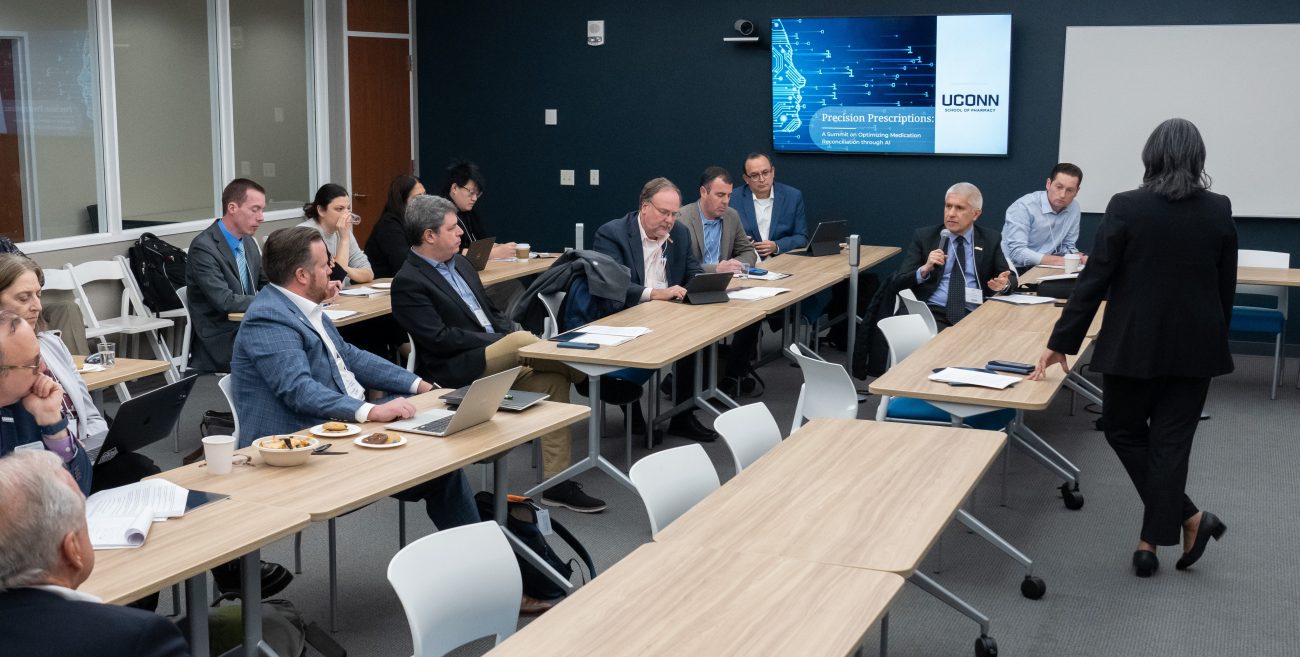Organized with the goal of fostering collaboration among stakeholders, the summit delved into technical, legal, ethical, and workflow-based AI solutions related to medication reconciliation. The ultimate objective was to develop a comprehensive framework for deploying AI tools that could significantly impact the accuracy and efficiency of medication reconciliation processes.
“Understanding what medications a person is taking is foundational to providing safe, accurate and timely healthcare,” said Sean Jeffery, Pharm.D., Clinical Professor of Pharmacy Practice at the UConn School of Pharmacy. “Unfortunately, this information is often difficult to ascertain as prescription data is siloed. This summit was an important step in identifying how AI can support clinicians, patients, and state regulators in better understanding prescription data.”
Jeffery, alongside Dr. Tom Agresta, Chair of Family Medicine at UConn Health, and Dr. Nitu Kashyap, Vice President and Chief Health Informatics Officer at Emory Healthcare, were inspired to host this summit after leading the state’s Medication Reconciliation & Polypharmacy Committee. They believe this committee is a crucial step in ascertaining which medications someone is actually taking.
“AI has the potential to improve the accuracy and timeliness of medication reconciliation,” said Jeffery. “Connecticut is taking a leading role in health AI through the state’s Health AI Collaborative and the School of Pharmacy supports these efforts.”
The summit’s lineup of speakers included renowned experts such as Dr. David Bates from Harvard Medical School, Dr. Sree Chaguturu, Executive Vice President and Chief Medical Officer at CVS Health, Dr. Tom Agresta, Sean Scanlon, State of Connecticut Comptroller, Sean Jeffery, and Dr. Nitu Kashyap. Welcoming remarks came from UConn’s president, Radenka Maric, Senator Richard Blumenthal, and Philip Hritcko, dean of the UConn School of Pharmacy.
The event covered a range of critical topics, including opportunities presented by the intersection of Medication Reconciliation and Artificial Intelligence, advancing the use of safe and responsible AI in healthcare, and a panel discussion on Medication Reconciliation in Connecticut and nationally.
In addition to presentations, the summit featured breakout sessions on reconciling legal, ethical, and bias issues in AI and Medication Reconciliation, creating a Med Rec AI Coalition, and exploring the future workforce, models, standards, and possibilities with AI in medication reconciliation.
“Medication Reconciliation is an essential part of every clinical care encounter yet is difficult to accomplish effectively and efficiently with the current manner in which we have deployed our healthcare technology, adding to the risk of burnout of our already stretched clinicians,” said Agresta. “If we can safely improve and streamline that process it can add back precious time to the patient-clinician encounter to focus on their healthcare. We have assembled a multi-disciplinary team to work on this challenge because patients deserve our best efforts to keep them safe and heal them.”
“Academic institutions, like the UConn School of Pharmacy, need to develop strategies to educate healthcare professionals to advance their knowledge, skills, and attitudes AI in this fast-changing digital environment,” said Dean Philip Hritcko. “This Summit is just the first of several events that we are planning to help prepare our faculty, students, and practicing pharmacists to work with these new technologies. We will first provide faculty with knowledge, skills, and opportunities for application of AI in the pharmacy classroom and pharmacy practice settings and then we will expand this to include pharmacy students and practicing pharmacists who need to be kept up to date with this technology.”



